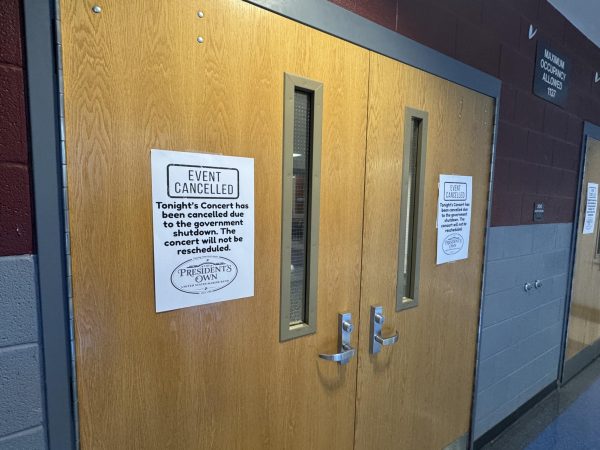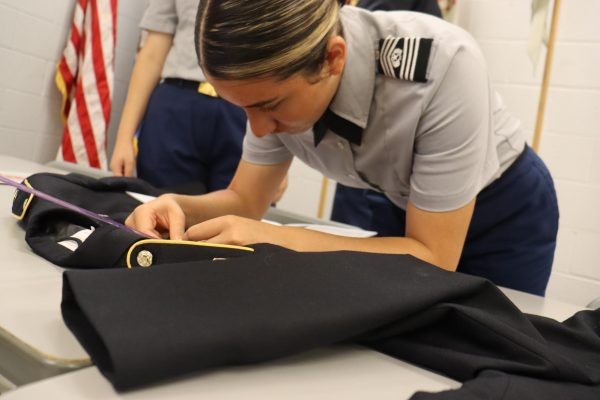Escobar-Medina describes coming out as a gay Latino
Junior Fernando Escobar-Medina believes as a gay Latino that society should open their minds to new ideas and embrace acceptance towards others.
“I was about six years old when I first knew. I didn’t know there was a word for it, I just kind of knew I liked guys.”
At the young age of six, junior Fernando Escobar-Medina found himself questioning his sexual identity. The curiosity followed into middle school where he had begun to act on it. After a conversation between him and his best friend discussing who their ideal crush was, he was forced to break the silence and come out.
“I felt paralyzed and vulnerable because I didn’t feel in control of the situation,” Escobar-Medina said. “My biggest fear was that I wasn’t gonna be accepted or I would have to deal with it on my own, that I would be judged and bullied, but [luckily] none of that actually really happened.”
This was the beginning of Escobar-Medina’s journey toward acceptance of his sexual orientation. Escobar-Medina stated that coming out to close friends helped him build confidence in telling his parents on Labor Day of last year.
“My parents, they knew I was hiding a secret from them and they told me ‘whatever you’re not telling us, you can trust us’ so I felt like they already knew so I decided to tell them,” Escobar-Medina said. “My parents were very supportive, but my mom did have a lot of questions, but at the end she took it well. She was supportive, and it’s kind of a long process especially with your family because I have been hiding something from them for a long time.”
As a Latino, Escobar-Medina recognizes the difficulty of coming out in the Latino community, but has taken pride in his diverse background despite this.
“I appreciate who I am. I accept that I am different from everybody else and I don’t act like most guys or do what other guys do, but it was a challenge coming out,” Escobar-Medina said. “I felt like it took a lot of guts to come out to my parents especially since I’m a Latino, [because] you have such high standards [within the Latino community].”
On the other end of the spectrum, new challenges arose in his personal and public life after coming out. He has dealt with stereotypes and misconceptions relating to the LGBTQ+ community and has even taken cautionary steps before forming friendships with other people.
“I don’t like when guys say ‘Oh that’s gay’ [because] they give a bad connotation to it. Some of my friends [will] say it and I’ll tell them ‘Hey don’t you say that because that’s not actually what it means’ just say it’s not cute or ugly, [or] just use something else that’s meant for that purpose,” Escobar-Medina said. “Before I make new friends, I usually get to know them and know where they stand to see if their accepting or not. I’ll slide in [the conversation] that ‘Hey I’m gay just to let you know’ to see if their still willing to be friends and most of them are really cool about it.”
Among other difficulties, he has been brought down by other people because of his sexual orientation. This has led to them to denounce his capabilities and interests as a male because of it. Escobar-Medina also believes people have expected him to ‘not be able to like types of things that other guys do’.
“I don’t walk, talk or have the same hobbies others [guys have], although some people [do] underestimate my interests. For example, I like to go skiing and working with tools because it’s fun to get my hands dirty sometimes.”
Escobar-Medina has made it an obligation to make others at school feel comfortable and accepted with who they identify as. With monumental strides of progress being made due to the changing political climate for LGBTQ+ teens and adults alike, the fight for more equality and acceptance still continues today. A survey of 10,000 LGBTQ+-identified youth, conducted by Human Right Campaign, has revealed that 4 out of 10 LGBTQ+ youth believe their community that they live in is not accepting of LGBTQ+ people. Escobar-Medina has argued that society needs to open their minds to showing acceptance toward others and hopes for change in the future.
“We still face difficulties because some people [have an old-school way of thinking] and believe relationships should be between a male and female, but those people just don’t understand that their opinion doesn’t matter if they aren’t accepting,” Escobar-Medina said. “Society needs to keep in mind that if someone close to you comes out, they aren’t looking for your criticism, they are looking for your acceptance and comfort.”
Your donation will support the student journalists of Harrisonburg High School. Your contribution will allow us to purchase equipment and cover our annual website hosting costs.












